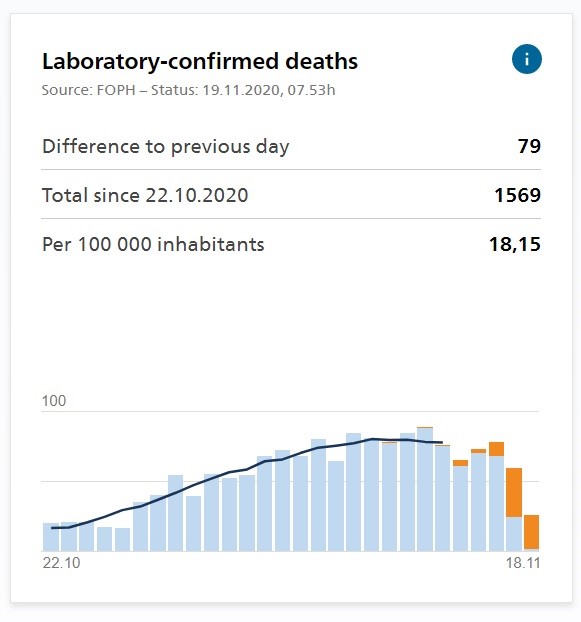
Alarming numbers, scepticism and reassurance
Things have taken a very serious turn in Switzerland since I last wrote about coronavirus six weeks ago. We are now well into the second wave of the pandemic with higher absolute numbers of positive cases, hospitalisations and deaths than were seen in the spring. Among the highest rates in Europe.
Some 1,600 lives were lost to Covid-19 here in the last four weeks alone bringing the total deaths for the nine months of the pandemic to around 3,500. As you can see from this Federal Office of Public Health (FOPH) data, it appears that the worst is over – for now. This information is from the FHOP’s dedicated coronavirus websiteExternal link which posts the latest numbers every morning from Monday to Thursday.

More reason than ever to welcome the recent progress in vaccine development. First, we had Pfizer and BioNTech announcing on November 9External link that their vaccine candidate was found to be more than 90 per cent effective in preventing Covid-19.
Next came Moderna with its news of a 95% effective messenger RNA (mRNA) vaccine, also in clinical trials of tens of thousands of people. As mentioned before, Moderna has a production site in Visp, Switzerland through its Swiss partner Lonza. You can read our latest story about vaccine approvals and procurement in Switzerland here.
Sceptisicm
This week, we asked our readers whether they would get vaccinated for Covid-19, and responses varied widely. (Let us know what you think by joining the debate here!)
Some people I know have expressed scepticism about the safety or efficacy of vaccines developed so quickly, and these concerns are understandable. The issue is very well explained in this Twitter threadExternal link by Mark ToshnerExternal link, a clinical trials doctor from Cambridge University who responds to the charge that vaccines “normally take 10 years”. Apparently most of those 10 years are usually spent waiting around.
“Safety hasn’t been compromised. 100s of thousands of great people volunteered for experimental vaccines. The world watched closely. The press reported every serious adverse event. There have so far been a handful. A triumph of good people/good process,” he writes.
For a slightly less enthusiastic report on the potential transient side effects of the new vaccines, check out this Science magazine articleExternal link that talks about reactogenicity and includes a first-hand account from a trial volunteer.
And this behind-the-scenes report in NatureExternal link by Teresa Lambe, a vaccine investigator working at the University of Oxford’s Jenner Institute is also enlightening. The institute has partnered with vaccine manufacturer AstraZeneca.
Lambe’s team was prepared to act quickly. “The lab had been working on vaccines for other pathogens, including a type of coronavirus that causes Middle East respiratory syndrome (MERS),” she says.
Coming up soon on swissinfo.ch, we’ll have a story from our journalist and fact-checking expert Geraldine Wong about where willingness to be vaccinated stands in Switzerland and what the government is planning on doing to ensure enough people get the jab for it to work.
Planning ahead
Moving on to other topics, you may remember I mentioned the Cargo Sous Terrain Project back in August – a multi-billion-franc underground tunnel network for Swiss freight transport. Daniele Mariani has a report on the latest developments in this project to bring you up to date.
Another major issue for the future is the potential threat posed by artificial intelligence in our societies. A new centre for AI research at the federal technology institute ETH Zurich, launched last month, wants to put people at the centre of its work.
The centre has a core team of 29 professorships from seven departments and the aim is to increase to 100 professorships in the near future. In an interview, Alexander Illic, director of the ETH AI Center, tells Christian Raaflaub that part of the role of the new hub is dialogue with the public.
“The AI research centre aims to connect Europe’s leading AI hotspots and build bridges between fields of expertise, so that trustworthy, widely accessible and inclusive AI systems can be developed for society,” Illic says.
The centre will also become an incubator for start-ups and support them in their development.
One positive example of AI relates to jaundice in newborn babies. A very common disease in the early days of life, jaundice can become critical and have lifelong consequences if not treated.
With the aid of a new AI model, researchers at ETH ZurichExternal link have succeeded in developing a new app that can predict the disease in babies 48 hours before the first symptoms appear with just four indicators.
Finally, a mind-bending story from researchers at Lausanne’s federal institute of technology, EPFL, about organoids, tiny lab-grown tissues and organs that are anatomically correct and physiologically functional.
Bioengineers there have used organoids to mimic the early development of the heart in the mouse embryo. The work is another step towards future bioartificial organs and you can read more about it hereExternal link.

In compliance with the JTI standards
More: SWI swissinfo.ch certified by the Journalism Trust Initiative































Join the conversation!